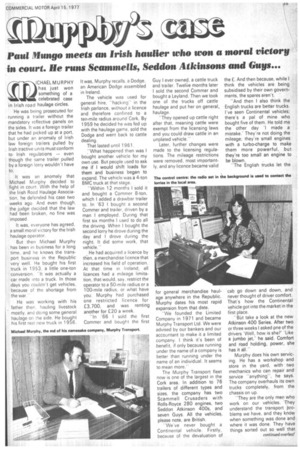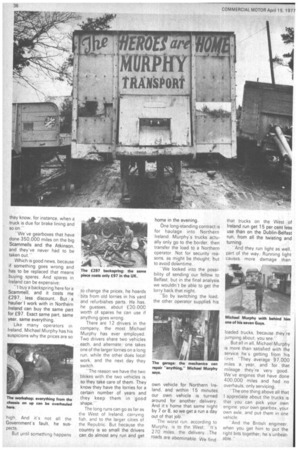Paul Mingo meets an Irish haulier who won a moral victory in court. He runs Scammells, Seddon Atkinsons and Guys...
Page 37

Page 38

If you've noticed an error in this article please click here to report it so we can fix it.
IDICHAEL MURPHY has just won something of a celebrated case in Irish road haulage circles.
He was being prosecuted for running a trailer without the mandatory reflective panels on the 'sides. It was a foreign trailer that he had picked up at a port, but under an anomaly of Irish law foreign trailers pulled by Irish tractive units must conform to Irish regulations -even though the same trailer pulled by a foreign lorry wouldn't have to.
It was an anomaly that Michael Murphy decided to fight in court. With the help of the Irish Road Haulage Association, he defended his case two weeks ago. And even though. the judge decided that the law had been broken, no fine was imposed.
It was, everyone has agreed, a small moral victory for the Irish haulage operator.
But then Michael Murphy has been in business for a long time, and he knows the transport. business in the Republic very well. He bought his first ' truck in 1953, a little one-ton conversion. -It was actually a car made into a truck. In those .days you couldn't get vehicles, because of the shortage from the war."'
He was working with his father then, hauling livestock mostly, and doing some general haulage on the side. He bought his first real new truck in 1956. It was, Murphy recalls, a Dodge, an American Dodge assembled in Ireland.
The vehicle was used for general hire, -hackingin the
Irish parlance, without a licence and therefore confined to a ten-mile radius around Cork. By 1959 he decided he was fed up with the haulage game, sold the Dodge and went back to cattle dealing.
That lasted until 1961.
; 'What happened then was I bought another vehicle for my own use. But people used to ask me if I would shift loads for them and business began to expand. The vehicle was a 4-ton BMC truck at that stage.
"Within 12 months I sold it and bought a Commer 8-ton, which I added a drawbar trailer to. In '63 I bought a second Comrner and trailer, driven by a man I employed. During that first six months I used to do all the driving. When I bought the second lorry he drove during the day and I drove during the night. It did some work, that vehicle."
He had acquired a licence by then, a merchandise licence that increased his field of operation.
At that time in Ireland, all licences had a mileage limita tion, that would, say, restrict the operator to a 50-mile radius or a 100-mile radius, or what have you. Murphy had purchased one restricted licence for £3,700, and was renting another for £20 a week.
"In '66 I sold the first Commer and bought the first Guy I ever owned, a cattle truck and trailer. TweIV'e months later I sold the second Commer and bought a Leyland. Then we took one of the trucks off cattle haulage and put her on general. haulage.
"They opened up cattle right after that, meaning cattle were exempt from the licensing laws and you could draw cattle in an unplated vehicle.
Later, further changes were made to the licensing regulations. The mileage restrictions were removed, most importantly, and any licence became valid for general merchandise haulage anywhere in the Republic. Murphy dates his most rapid expansion from that date.
-We founded the Limited Company in 1971 and became Murphy Transport Ltd. We were advised by our bankers and our accountant to make it a limited company. I think it's been of benefit, if only because running under the name of a company is better than running under the name of an individual. It seems to mean more."
The Murphy Transport fleet now is one of the largest in the Cork area, In addition to 76 trailers of different types and sizes, the company has two Scammell Crusaders with Rolls-Royce 280 engines, two Seddon Atkinson 400s, and. seven Guys. All the vehicles, please note, are British.
"We've never bought a Continental vehicle. Firstly, because of the devaluation of the £. And then because, while I think the vehicles are being subsidised by their own governments, the spares aren't.
"And then I also think the English trucks are better trucks. I've seen Continental vehicles; there's a pal of mine who bought five of them. He told me the other day 'I made a mistake.' They're not doing the mileage; they're small engines with a turbo-charge to make them more powerful, but they're too small an engine to be blown.
"The English trucks let the cab go down and down, and never thought of driver comfort. That's how the Continental vehicle got into the market in the first place.
"BLit take a look at the new Atkinson 400 Series. After two or three weeks I asked one of the drivers 'Well, how is she?' 'Like a jumbo jet,' he said. Comfort and road holding, power, she has it all."
Murphy does his own servic ing. He has a workshop and store in the yard, with two mechanics who can repair and service "anything-, he says. The company overhauls its own trucks completely, from the chassis on up.
-They are the only men who work on our vehicles. They understand the transport problems we have, and they know when something was done and where it was done. They have things sorted out so well that
they know, for instance, when a truck is due for brake lining and so
-We've gearboxes that have done 350,000 miles on the big Scammells and the Atkinson, and they've never had to be taken out.
Which is good news, because if something goes wrong and has to be replaced that means buying spares. And spares in Ireland can be expensive; ''l buy a backspring here for a Scammell, and it costs me £297, less discount. But a haulier I work with in Northern Ireland can buy the same part for £97. Exact same part, same year, same everything.
Like many operators in Ireland, Michael Murphy has his suspicions why the prices are so high, And it's not all the Government's fault, he suspects.
But until something happens to change the prices, he hoards bits from old lorries in his yard and refurbishes parts. He has, he guesses, about £20.000 worth of spares he can use if anything goes wrong.
There are 12 drivers in the company, the most Michael Murphy has ever employed. Two drivers share two vehicles each, and alternate; one takes one of the larger lorries on a long run, while the other does local work, and the next day they switch.
"The reason we have the two blokes with the two vehicles is so they take care of them. They
know they have the lorries for a certain number of years and they keep them in 'good shape.
The long runs can go as far as the West of Ireland, carrying fish, and to the larger cities of the Republic, But because the country is so small the drivers can do almost any run and get home in the evening.
One long-standing contract is for haulage into Northern Ireland. Murphy's trucks actually only go to the border, then transfer the load to a Northern operator Not for security reasons, as might be thought, but to avoid dovntirne.
-We looked into the possibility of sending our fellow to Belfast, but in the final analysis we wouldn't be able to get the lorry back that night.
-So by switching the load, the other operator supplieS his
own vehicle for Northern Ireland, and within 15 minutes our own vehicle is turned around for another delivery. And it s home that same night by 7 or 8, so we get a run a day out of that job."
The worst run, according to Murphy, is to the West: "It's 270 miles, the delivery. The roads are abominable. We find that trucks on the West of Ireland run get 15 per cent less use than on the Dublin-Belfast run, from all the twisting and turning.
-And they run light as well, part of the way. Running light causes more damage than loaded trucks, because they're jumping about. you see.
But all in all, Michael Murphy is more than satisfied with the service he's getting from his fleet. -They average 97,000 miles a year, and for that mileage they're very good. We've engines that have done 400,000 miles and had no overhauls, only servicing.
-The one thing above all that I appreciate about the trucks is that you can pick your own engine, your own gearbox, your own axle, and putthem in one vehicle
And the British engineer, when you get him to put the right bits together, he's unbeatable.'"




























































































